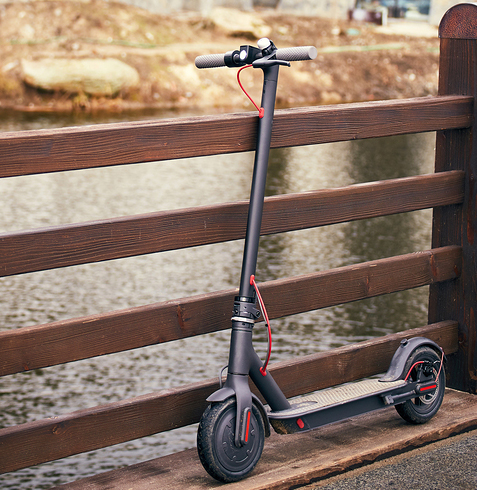Compensation for Bird and Lime Electric Scooter Injury Victims
It seems as if dockless bikes and scooters popped up by the thousands overnight in many US cities and in many cases, cities were inadequately prepared for the invasion. This has created a dangerous environment full of potential hazards ranging from the scooters and bikes being left unmonitored on sidewalks to riders exceeding safe speeds in high pedestrian traffic areas to riders endangering themselves by riding at high speeds without helmets or even while intoxicated.
The potential to be injured from the reckless behavior of the scooter companies or their failure to ensure the safety of their riders is a very real risk and puts both riders, innocent bystanders and others in danger.
Who Is Liable for an Accident on a Scooter?
Since Lime and Bird scooters are still new, they’re an evolving area of law. However, there are several ways in which a person may incur injury on a Bird scooter. Some examples include:
- A pedestrian collides with a Bird scooter at an intersection
- A scooter collides with a vehicle
- A scooter hits a pothole or other debris
- A pedestrian trips over abandoned scooter on the sidewalk

Lack of Regulations
The potential to be injured from the reckless behavior of the scooter companies or their failure to ensure the safety of their riders is a very real risk and puts both riders, innocent bystanders and others in danger.
Lack of Regulations
Whether Bird is intentionally flouting legal issues and disregarding communities in their mission towards lightning-fast proliferation and profit is a matter of opinion; however, what isn’t left up to debate is the fact that inadequate regulations have made these scooters dangerous.
First, Bird scooters can go as fast as 15 miles per hour, a level of speed which the casual rider may not be ready to handle. People who ride beyond their ability (which happens more often than one would think) pose a danger to the pedestrians around them as well as themselves. In fact, there has already been a report of a Bird scooter vs. car accident in which a female rider sustained moderate head trauma.
Second, a person can trip over a Bird scooter left on a sidewalk and sustain injuries from the resulting fall. As previously mentioned, riders all too often leave scooters in unsafe areas.
Finally, a defective Bird scooter can malfunction, causing a rider to fall and injure themselves.
Were you or a loved injured as the result of a Bird or Lime Electric Scooter?
Find out if you may qualify for compensation.
Find Out MoreConsumer Safety Watch offers safety advocate services and attorney referral services for patients throughout the United States including the states of Alabama, Alaska, Arizona, Arkansas, California, Colorado, Connecticut, Delaware, Florida, Georgia, Hawaii, Idaho, Illinois, Indiana, Iowa, Kansas, Kentucky, Louisiana, Maine, Maryland, Massachusetts, Michigan, Minnesota, Mississippi, Missouri, Montana, Nebraska, Nevada, New Hampshire, New Jersey, New Mexico, New York, North Carolina, North Dakota, Ohio, Oklahoma, Oregon, Pennsylvania, Rhode Island, South Carolina, South Dakota, Tennessee, Texas, Utah, Vermont, Virginia, Washington, West Virginia, Wisconsin and Wyoming.
Consumer Safety Watch offers consumer safety advocate services or can help you find an attorney throughout the United States including the following cities: Albuquerque, NM; Arlington, TX; Atlanta, GA; Austin, TX; Baltimore, MD; Boston, MA; Charlotte, NC; Chicago, IL; Cleveland, OH; Colorado Springs, CO; Columbus, OH; Dallas, TX; Denver, CO; Detroit, MI; Fresno, CA; Fort Worth, TX; Indianapolis, IN; Honolulu, HI; Houston, TX; Jacksonville, FL; Kansas City, KS; Kansas City, MO; Las Vegas, NV; Long Beach, CA; Los Angeles, CA; Louisville, KY; Memphis, TN; Mesa, AZ; Miami, FL; Miami, OH; Milwaukee, WI; Minneapolis, MN; Nashville, TN; New York City, NY; Oakland, CA; Oklahoma City, OK; Omaha, NE; Philadelphia, PA; Phoenix, AZ; Pittsburgh, PA; Portland, OR; Sacramento, CA; San Antonio, Tx; San Diego, CA; San Francisco, CA; San Jose, CA; Seattle, WA; St. Louis, MO; Tampa, FL; Tucson, AZ; Tulsa, Virginia Beach, VA; Washington, DC; Wichita, KS.
This website is not affiliated with any pharmaceutical or medical device company or any trademarked product. Results are not guaranteed. This website provides a free matching service and is not responsible for information or services from third party providers. Consumer Safety Watch is not a law firm. Every case is different and services available can vary.


